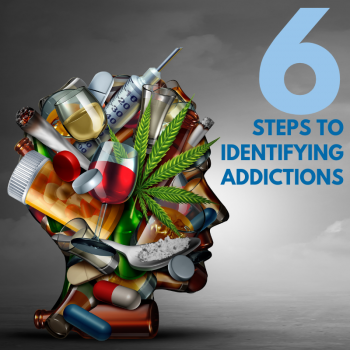Home / Health & Wellness Articles / Addiction /
Six Steps to Identifying Addictions: What Controls Your Life?

This article is not meant to be a thorough review of the many complex problems and solutions of all addictions–such as drug and alcohol abuse–but rather an overview of how to identify potential addictions and an invitation to examine yourself in terms of the negative habits that may have gained control over your life. Here are six steps to identify addictions.
Face Your Fake “Friends”
- What do you crave for comfort?
- What have you lost control over?
Addictions are like fake best friends; they only tell us what we want to hear. They don’t tell us the truths that would shake us up, shatter our fantasies or ground us in reality. Fake “friends” represent your addictions.
The first step in identifying an addiction is to recognize it and accept it. Name the object, the substance or the activity that consumes your life. What do you crave when you need comfort, when you need excitement or when you need to escape? It could be alcohol, shopping, sex or smoking, to name a few. Facing the fake friend of your addiction puts you in a starting position of truth to begin relating to it as what it really is: an adversary, not a friend.
Speak Your Stress
- What problem are you avoiding?
- What is the stress behind the symptom?
What is your addiction helping you cope with? What delinquent purpose is it serving in your life? What problems or challenges are you attempting to cover up? To speak your stress is to name what is not working in your life. Here are common sources of stress that you may believe excuse your negative habits:
- Relationship problems
- Depression
- Low self-esteem
- Financial problems
- Traumatic experiences
- Grief and loss
- “Unfair” circumstances
- Family chaos or crisis
- Loss of dreams, direction or life purpose
Rate Your Rationalizations
- What is your excuse?
- Write out reasons for continuing habit.
Rationalizations are excuses we tell ourselves to try and make “OK” some action, attitude or behavior that is unhealthy and ultimately damages others and ourselves. Rate your rationalizations in terms of your most “favorite” or most commonly used ones. You could probably list many reasons for defending for your choices. Perhaps you have become an expert at delivering lies of permission to yourself and to others. Here are a few justifications that may sound familiar:
- I deserve it.
- It’s not hurting anyone.
- Just this once/Just for today.
- It’s no big deal.
- It is not as bad as other people’s habits.
- I am really a good person.
- I’ll change it tomorrow (next week, next year, after the holidays, after this crisis).
- I can stop whenever I want.
Challenge Its Coping Strength
- Is your problem fixed?
- Can you depend on your dependence?
Addictions are pretend solutions – solutions that are short-term at best. If your compulsive behaviors have become out of control, are they really reducing your stress? Do they truly enliven your life, increase your satisfaction, increase your confidence or give you happiness, joy or any sustainable satisfaction? Or are they just distracting you from your real desires?
How many times can you keep wishing yourself into wellness by turning to something outside of yourself? How many times do you need to be let down and discouraged because your addictive habit has no healing power at all? To challenge the coping strength of any addiction is to look at its true effect as simply more problems that add to what you are trying to avoid.
Put the Pains & Gains on Paper
- List the damages of your denial.
- List the reasons for regaining your life.
There are many painful and harmful side effects associated with addictions. Often it is your family who pays the price of these selfish and self-destructive actions. To get a real perspective of the effects, make a list of all the negative consequences of your continued behavior. Take note of and be aware of how you could lose something you value – perhaps your family, your health, your job and your real friends. There are damages that will accelerate until the habitual pattern stops.
Equally important is to acknowledge the benefits of regaining your life. What are the advantages of no longer being a slave to your addiction? How many ways can you benefit emotionally, physically, financially and more? Unfortunately, many addicted individuals cannot see beyond their current distraction and the satisfaction of their dysfunctional coping style. I encourage you to consider all that you could regain with a new life direction.
Step Toward Success with Support
- Decide and do differently.
- You are not alone!
When you feel you have gotten all the mileage out of your unhealthy choices and you are ready to admit they are not making your life any better, you can then begin stepping toward success. When “enough is enough,” you can make a life-changing decision. You don’t have to have the answers to stop your addiction or to fix the problems in your life. You just have to be open to learn – open to ask for help. You can, in fact, learn how to get your needs met without your destructive addiction. Your situation is not unsolvable.You are not alone. There are very successful solutions and supports to guide you in recovering from whatever controls your life – the addictions you battle. Take that step today.


